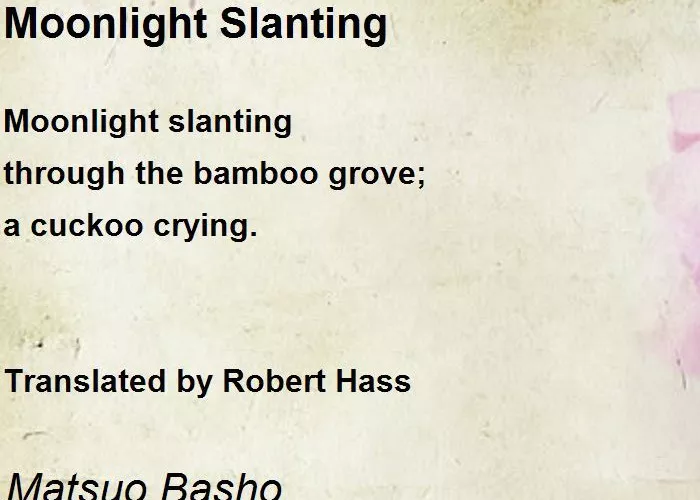Welcome to Poem of the Day – Moonlight Slanting by Matsuo Basho.
Matsuo Bashō, one of the most revered figures in Japanese literature, is renowned for his profound and subtle haiku poetry. His works delve into the ephemeral beauty of nature, human existence, and the passage of time. One of his notable haikus is titled “Moonlight slanting” which exemplifies his mastery in capturing fleeting moments of insight. Although the haiku itself is deceptively simple, it encapsulates Bashō’s deep awareness of the interplay between nature and the human spirit.
Moonlight Slanting Poem
moonlight slanting
through the bamboo grove;
a cuckoo crying
Moonlight Slanting Poem Explanation
As is typical of haiku, the structure is minimal, with a syllabic count of 5-7-5. The economy of words in haiku forces the poet to focus on an essence, capturing a moment in nature that is representative of something much larger. Bashō’s haiku employs the simplicity of form to convey complex emotions. This brevity, however, should not be confused with lack of depth; on the contrary, it enhances the impact of the moment captured.
In the first line, “Moonlight slanting”, Bashō sets the stage with a concise image, immediately invoking the quiet elegance of the moon. The term “slanting” is crucial; it implies an indirectness, a softening of the light’s impact. Unlike a direct, harsh glare, the slanting moonlight suggests subtlety and grace. It conveys an image of light that is both powerful and gentle, filtering through the branches of trees, enhancing the mood of tranquility.
The Role of Nature
Bashō is often praised for his ability to intertwine nature and human emotion, and in this haiku, the natural elements are not just a backdrop, but active participants in the scene. The pines, in particular, hold symbolic weight. In Japanese culture, pines are often associated with endurance and longevity due to their evergreen nature. Their role in the poem suggests that even as time passes and moments come and go, the natural world remains, constant and eternal, like the slanting light of the moon itself.
The waves, too, play a significant role. They move in response to the moon’s light, symbolizing the transient and ever-changing aspect of life. Waves can be seen as a metaphor for human emotions—constantly shifting, yet forever influenced by forces beyond our control. The gentle touch of the moonlight on the waves evokes a sense of peaceful interaction between the forces of nature, suggesting harmony and acceptance in the face of life’s fleeting nature.
The Ephemeral Moment
At the heart of Bashō’s haiku is the theme of wabi-sabi, the Japanese aesthetic that finds beauty in imperfection and transience. The moment depicted is fleeting—the moonlight only briefly touches the waves, and soon the scene will change as time passes. The transient nature of the moonlight speaks to the impermanence of life itself, a central theme in much of Bashō’s poetry. Just as the moonlight is momentary, so too are human lives, thoughts, and emotions. Yet, in this brief moment, there is beauty and meaning.
In the second line, “Through the pines, it touches”, Bashō brings attention to the delicate interaction between the moonlight and the natural world. The touch of the moonlight on the waves is a reminder that even the most imperceptible actions leave their mark, just as small moments in life can have deep and lasting impacts, even if only for a short time.
Silence and Stillness
Bashō’s haiku also evokes a deep sense of stillness and silence. The simplicity of the image, coupled with the quiet natural setting, conveys a moment of meditation. The absence of human presence intensifies the solitude and peace, making the natural world seem both vast and intimate. The slanting moonlight, the pine trees, and the waves create a contemplative atmosphere, inviting the reader to pause and reflect on the passing of time, the beauty of the present moment, and the impermanence of life.
Conclusion
In “Moonlight Slanting”, Matsuo Bashō demonstrates his unique ability to encapsulate profound philosophical insights within the constraints of haiku form. The image of the slanting moonlight not only evokes the beauty of the natural world but also mirrors the transient nature of human experience. Through the interplay of light, nature, and time, Bashō’s haiku captures a moment that is both fleeting and eternal, inviting the reader to reflect on the nature of existence itself. As with many of his works, the haiku leaves a lingering sense of peace, a quiet appreciation for the subtle beauty that exists in the world around us.

